Globalization's Impact: Economic Interdependence and Cultural Exchange
VerifiedAdded on 2020/01/15
|8
|2915
|157
Essay
AI Summary
This essay provides a comprehensive analysis of globalization, exploring its multifaceted impacts on the global economy, culture, and politics. It delves into the definitions and elements of globalization, including economic interdependence, international trade, and cultural exchange. The essay examines both the positive and negative consequences of globalization, such as its effects on economic growth, employment, trade deficits, and the environment. It also focuses on the specific impact of globalization on the UK economy, discussing issues like competitiveness, employment shifts, price levels, and the effects of international trade. The essay highlights the role of various institutions and factors, including technological advancements, transportation, and political agreements, in shaping the globalization process and its implications for businesses and countries worldwide. Furthermore, it discusses the challenges and opportunities that globalization presents to different sectors and individuals, concluding with an assessment of the overall impact of globalization on human development and the need for countries to embrace it effectively.
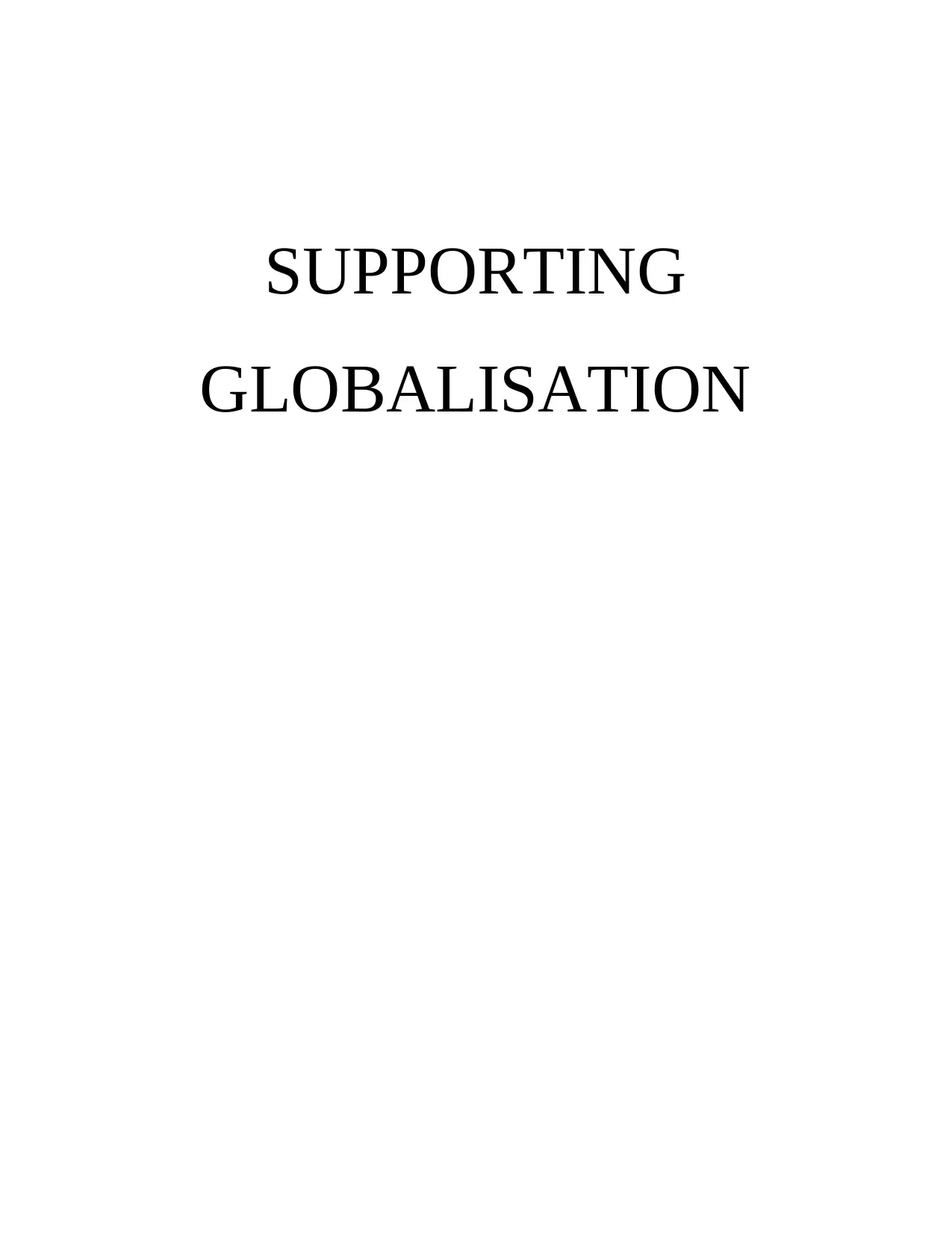
SUPPORTING
GLOBALISATION
GLOBALISATION
Paraphrase This Document
Need a fresh take? Get an instant paraphrase of this document with our AI Paraphraser
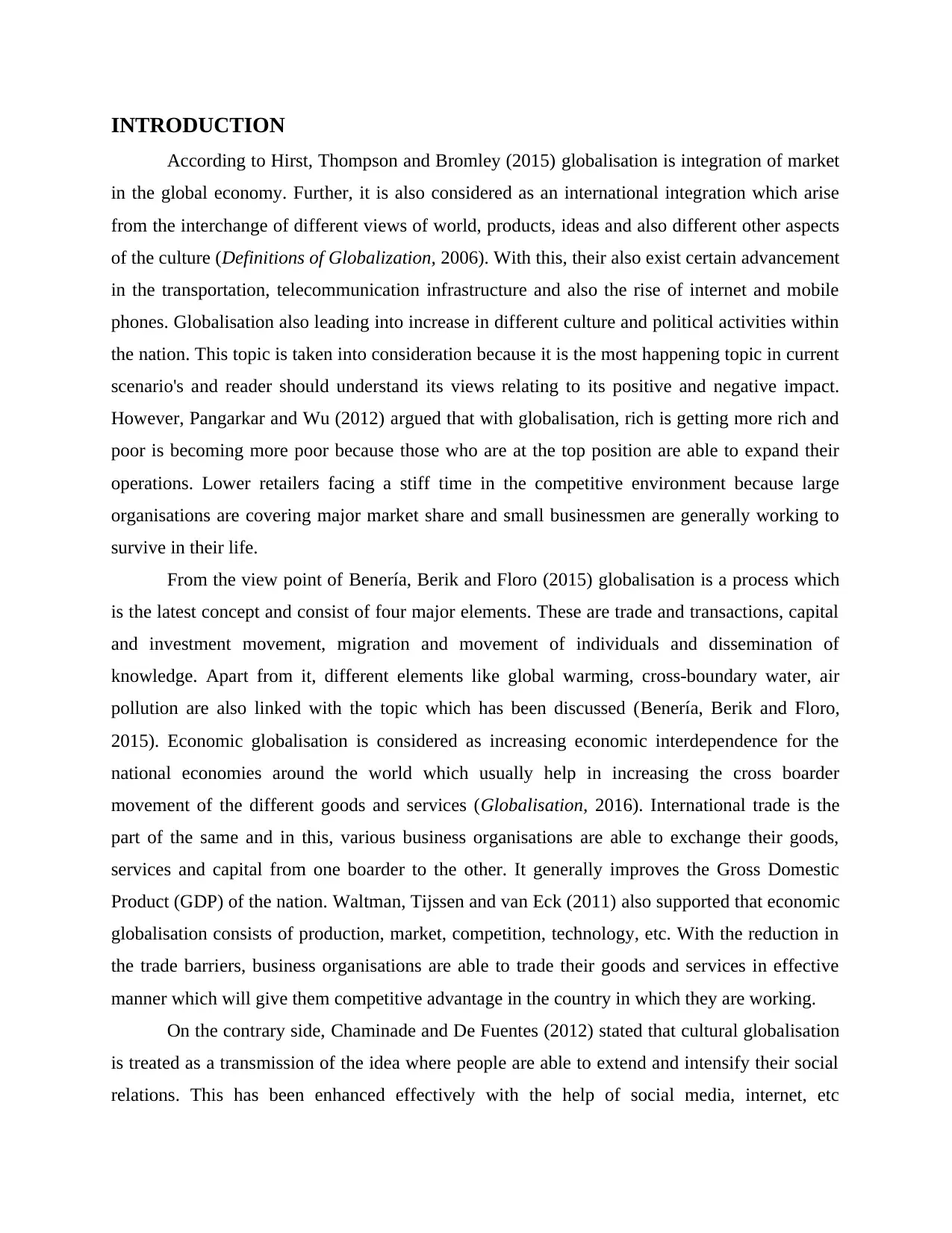
INTRODUCTION
According to Hirst, Thompson and Bromley (2015) globalisation is integration of market
in the global economy. Further, it is also considered as an international integration which arise
from the interchange of different views of world, products, ideas and also different other aspects
of the culture (Definitions of Globalization, 2006). With this, their also exist certain advancement
in the transportation, telecommunication infrastructure and also the rise of internet and mobile
phones. Globalisation also leading into increase in different culture and political activities within
the nation. This topic is taken into consideration because it is the most happening topic in current
scenario's and reader should understand its views relating to its positive and negative impact.
However, Pangarkar and Wu (2012) argued that with globalisation, rich is getting more rich and
poor is becoming more poor because those who are at the top position are able to expand their
operations. Lower retailers facing a stiff time in the competitive environment because large
organisations are covering major market share and small businessmen are generally working to
survive in their life.
From the view point of Benería, Berik and Floro (2015) globalisation is a process which
is the latest concept and consist of four major elements. These are trade and transactions, capital
and investment movement, migration and movement of individuals and dissemination of
knowledge. Apart from it, different elements like global warming, cross-boundary water, air
pollution are also linked with the topic which has been discussed (Benería, Berik and Floro,
2015). Economic globalisation is considered as increasing economic interdependence for the
national economies around the world which usually help in increasing the cross boarder
movement of the different goods and services (Globalisation, 2016). International trade is the
part of the same and in this, various business organisations are able to exchange their goods,
services and capital from one boarder to the other. It generally improves the Gross Domestic
Product (GDP) of the nation. Waltman, Tijssen and van Eck (2011) also supported that economic
globalisation consists of production, market, competition, technology, etc. With the reduction in
the trade barriers, business organisations are able to trade their goods and services in effective
manner which will give them competitive advantage in the country in which they are working.
On the contrary side, Chaminade and De Fuentes (2012) stated that cultural globalisation
is treated as a transmission of the idea where people are able to extend and intensify their social
relations. This has been enhanced effectively with the help of social media, internet, etc
According to Hirst, Thompson and Bromley (2015) globalisation is integration of market
in the global economy. Further, it is also considered as an international integration which arise
from the interchange of different views of world, products, ideas and also different other aspects
of the culture (Definitions of Globalization, 2006). With this, their also exist certain advancement
in the transportation, telecommunication infrastructure and also the rise of internet and mobile
phones. Globalisation also leading into increase in different culture and political activities within
the nation. This topic is taken into consideration because it is the most happening topic in current
scenario's and reader should understand its views relating to its positive and negative impact.
However, Pangarkar and Wu (2012) argued that with globalisation, rich is getting more rich and
poor is becoming more poor because those who are at the top position are able to expand their
operations. Lower retailers facing a stiff time in the competitive environment because large
organisations are covering major market share and small businessmen are generally working to
survive in their life.
From the view point of Benería, Berik and Floro (2015) globalisation is a process which
is the latest concept and consist of four major elements. These are trade and transactions, capital
and investment movement, migration and movement of individuals and dissemination of
knowledge. Apart from it, different elements like global warming, cross-boundary water, air
pollution are also linked with the topic which has been discussed (Benería, Berik and Floro,
2015). Economic globalisation is considered as increasing economic interdependence for the
national economies around the world which usually help in increasing the cross boarder
movement of the different goods and services (Globalisation, 2016). International trade is the
part of the same and in this, various business organisations are able to exchange their goods,
services and capital from one boarder to the other. It generally improves the Gross Domestic
Product (GDP) of the nation. Waltman, Tijssen and van Eck (2011) also supported that economic
globalisation consists of production, market, competition, technology, etc. With the reduction in
the trade barriers, business organisations are able to trade their goods and services in effective
manner which will give them competitive advantage in the country in which they are working.
On the contrary side, Chaminade and De Fuentes (2012) stated that cultural globalisation
is treated as a transmission of the idea where people are able to extend and intensify their social
relations. This has been enhanced effectively with the help of social media, internet, etc
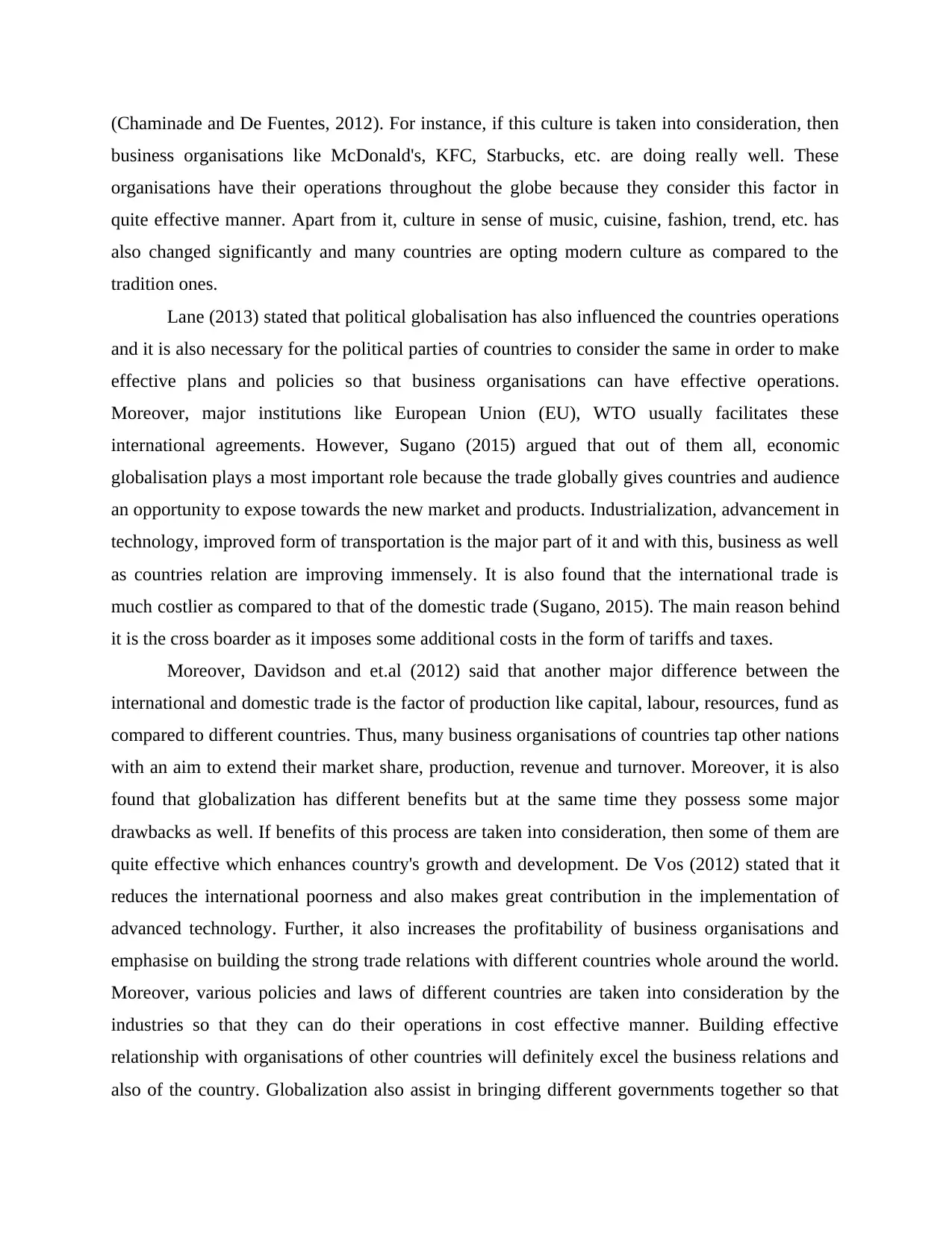
(Chaminade and De Fuentes, 2012). For instance, if this culture is taken into consideration, then
business organisations like McDonald's, KFC, Starbucks, etc. are doing really well. These
organisations have their operations throughout the globe because they consider this factor in
quite effective manner. Apart from it, culture in sense of music, cuisine, fashion, trend, etc. has
also changed significantly and many countries are opting modern culture as compared to the
tradition ones.
Lane (2013) stated that political globalisation has also influenced the countries operations
and it is also necessary for the political parties of countries to consider the same in order to make
effective plans and policies so that business organisations can have effective operations.
Moreover, major institutions like European Union (EU), WTO usually facilitates these
international agreements. However, Sugano (2015) argued that out of them all, economic
globalisation plays a most important role because the trade globally gives countries and audience
an opportunity to expose towards the new market and products. Industrialization, advancement in
technology, improved form of transportation is the major part of it and with this, business as well
as countries relation are improving immensely. It is also found that the international trade is
much costlier as compared to that of the domestic trade (Sugano, 2015). The main reason behind
it is the cross boarder as it imposes some additional costs in the form of tariffs and taxes.
Moreover, Davidson and et.al (2012) said that another major difference between the
international and domestic trade is the factor of production like capital, labour, resources, fund as
compared to different countries. Thus, many business organisations of countries tap other nations
with an aim to extend their market share, production, revenue and turnover. Moreover, it is also
found that globalization has different benefits but at the same time they possess some major
drawbacks as well. If benefits of this process are taken into consideration, then some of them are
quite effective which enhances country's growth and development. De Vos (2012) stated that it
reduces the international poorness and also makes great contribution in the implementation of
advanced technology. Further, it also increases the profitability of business organisations and
emphasise on building the strong trade relations with different countries whole around the world.
Moreover, various policies and laws of different countries are taken into consideration by the
industries so that they can do their operations in cost effective manner. Building effective
relationship with organisations of other countries will definitely excel the business relations and
also of the country. Globalization also assist in bringing different governments together so that
business organisations like McDonald's, KFC, Starbucks, etc. are doing really well. These
organisations have their operations throughout the globe because they consider this factor in
quite effective manner. Apart from it, culture in sense of music, cuisine, fashion, trend, etc. has
also changed significantly and many countries are opting modern culture as compared to the
tradition ones.
Lane (2013) stated that political globalisation has also influenced the countries operations
and it is also necessary for the political parties of countries to consider the same in order to make
effective plans and policies so that business organisations can have effective operations.
Moreover, major institutions like European Union (EU), WTO usually facilitates these
international agreements. However, Sugano (2015) argued that out of them all, economic
globalisation plays a most important role because the trade globally gives countries and audience
an opportunity to expose towards the new market and products. Industrialization, advancement in
technology, improved form of transportation is the major part of it and with this, business as well
as countries relation are improving immensely. It is also found that the international trade is
much costlier as compared to that of the domestic trade (Sugano, 2015). The main reason behind
it is the cross boarder as it imposes some additional costs in the form of tariffs and taxes.
Moreover, Davidson and et.al (2012) said that another major difference between the
international and domestic trade is the factor of production like capital, labour, resources, fund as
compared to different countries. Thus, many business organisations of countries tap other nations
with an aim to extend their market share, production, revenue and turnover. Moreover, it is also
found that globalization has different benefits but at the same time they possess some major
drawbacks as well. If benefits of this process are taken into consideration, then some of them are
quite effective which enhances country's growth and development. De Vos (2012) stated that it
reduces the international poorness and also makes great contribution in the implementation of
advanced technology. Further, it also increases the profitability of business organisations and
emphasise on building the strong trade relations with different countries whole around the world.
Moreover, various policies and laws of different countries are taken into consideration by the
industries so that they can do their operations in cost effective manner. Building effective
relationship with organisations of other countries will definitely excel the business relations and
also of the country. Globalization also assist in bringing different governments together so that
⊘ This is a preview!⊘
Do you want full access?
Subscribe today to unlock all pages.

Trusted by 1+ million students worldwide
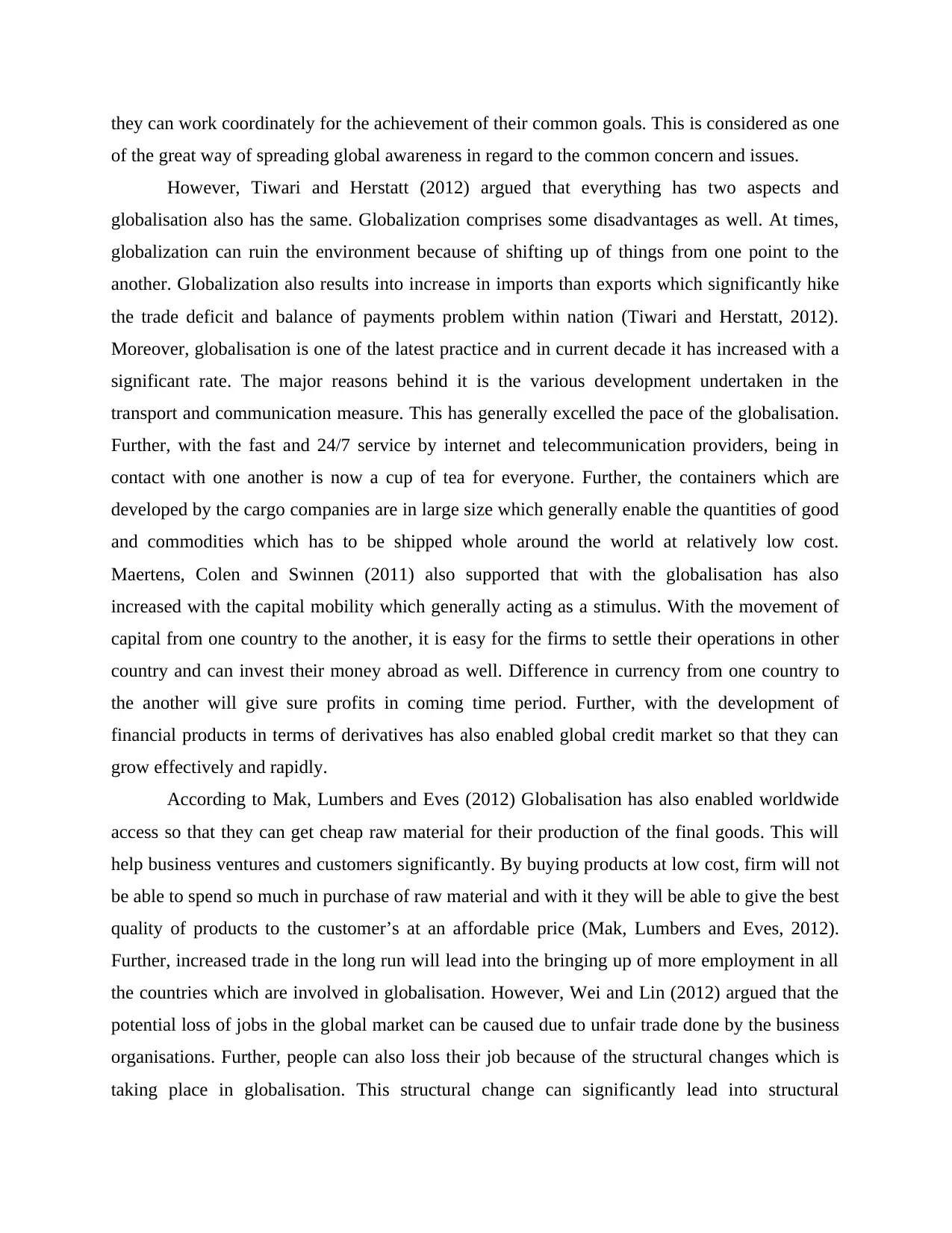
they can work coordinately for the achievement of their common goals. This is considered as one
of the great way of spreading global awareness in regard to the common concern and issues.
However, Tiwari and Herstatt (2012) argued that everything has two aspects and
globalisation also has the same. Globalization comprises some disadvantages as well. At times,
globalization can ruin the environment because of shifting up of things from one point to the
another. Globalization also results into increase in imports than exports which significantly hike
the trade deficit and balance of payments problem within nation (Tiwari and Herstatt, 2012).
Moreover, globalisation is one of the latest practice and in current decade it has increased with a
significant rate. The major reasons behind it is the various development undertaken in the
transport and communication measure. This has generally excelled the pace of the globalisation.
Further, with the fast and 24/7 service by internet and telecommunication providers, being in
contact with one another is now a cup of tea for everyone. Further, the containers which are
developed by the cargo companies are in large size which generally enable the quantities of good
and commodities which has to be shipped whole around the world at relatively low cost.
Maertens, Colen and Swinnen (2011) also supported that with the globalisation has also
increased with the capital mobility which generally acting as a stimulus. With the movement of
capital from one country to the another, it is easy for the firms to settle their operations in other
country and can invest their money abroad as well. Difference in currency from one country to
the another will give sure profits in coming time period. Further, with the development of
financial products in terms of derivatives has also enabled global credit market so that they can
grow effectively and rapidly.
According to Mak, Lumbers and Eves (2012) Globalisation has also enabled worldwide
access so that they can get cheap raw material for their production of the final goods. This will
help business ventures and customers significantly. By buying products at low cost, firm will not
be able to spend so much in purchase of raw material and with it they will be able to give the best
quality of products to the customer’s at an affordable price (Mak, Lumbers and Eves, 2012).
Further, increased trade in the long run will lead into the bringing up of more employment in all
the countries which are involved in globalisation. However, Wei and Lin (2012) argued that the
potential loss of jobs in the global market can be caused due to unfair trade done by the business
organisations. Further, people can also loss their job because of the structural changes which is
taking place in globalisation. This structural change can significantly lead into structural
of the great way of spreading global awareness in regard to the common concern and issues.
However, Tiwari and Herstatt (2012) argued that everything has two aspects and
globalisation also has the same. Globalization comprises some disadvantages as well. At times,
globalization can ruin the environment because of shifting up of things from one point to the
another. Globalization also results into increase in imports than exports which significantly hike
the trade deficit and balance of payments problem within nation (Tiwari and Herstatt, 2012).
Moreover, globalisation is one of the latest practice and in current decade it has increased with a
significant rate. The major reasons behind it is the various development undertaken in the
transport and communication measure. This has generally excelled the pace of the globalisation.
Further, with the fast and 24/7 service by internet and telecommunication providers, being in
contact with one another is now a cup of tea for everyone. Further, the containers which are
developed by the cargo companies are in large size which generally enable the quantities of good
and commodities which has to be shipped whole around the world at relatively low cost.
Maertens, Colen and Swinnen (2011) also supported that with the globalisation has also
increased with the capital mobility which generally acting as a stimulus. With the movement of
capital from one country to the another, it is easy for the firms to settle their operations in other
country and can invest their money abroad as well. Difference in currency from one country to
the another will give sure profits in coming time period. Further, with the development of
financial products in terms of derivatives has also enabled global credit market so that they can
grow effectively and rapidly.
According to Mak, Lumbers and Eves (2012) Globalisation has also enabled worldwide
access so that they can get cheap raw material for their production of the final goods. This will
help business ventures and customers significantly. By buying products at low cost, firm will not
be able to spend so much in purchase of raw material and with it they will be able to give the best
quality of products to the customer’s at an affordable price (Mak, Lumbers and Eves, 2012).
Further, increased trade in the long run will lead into the bringing up of more employment in all
the countries which are involved in globalisation. However, Wei and Lin (2012) argued that the
potential loss of jobs in the global market can be caused due to unfair trade done by the business
organisations. Further, people can also loss their job because of the structural changes which is
taking place in globalisation. This structural change can significantly lead into structural
Paraphrase This Document
Need a fresh take? Get an instant paraphrase of this document with our AI Paraphraser
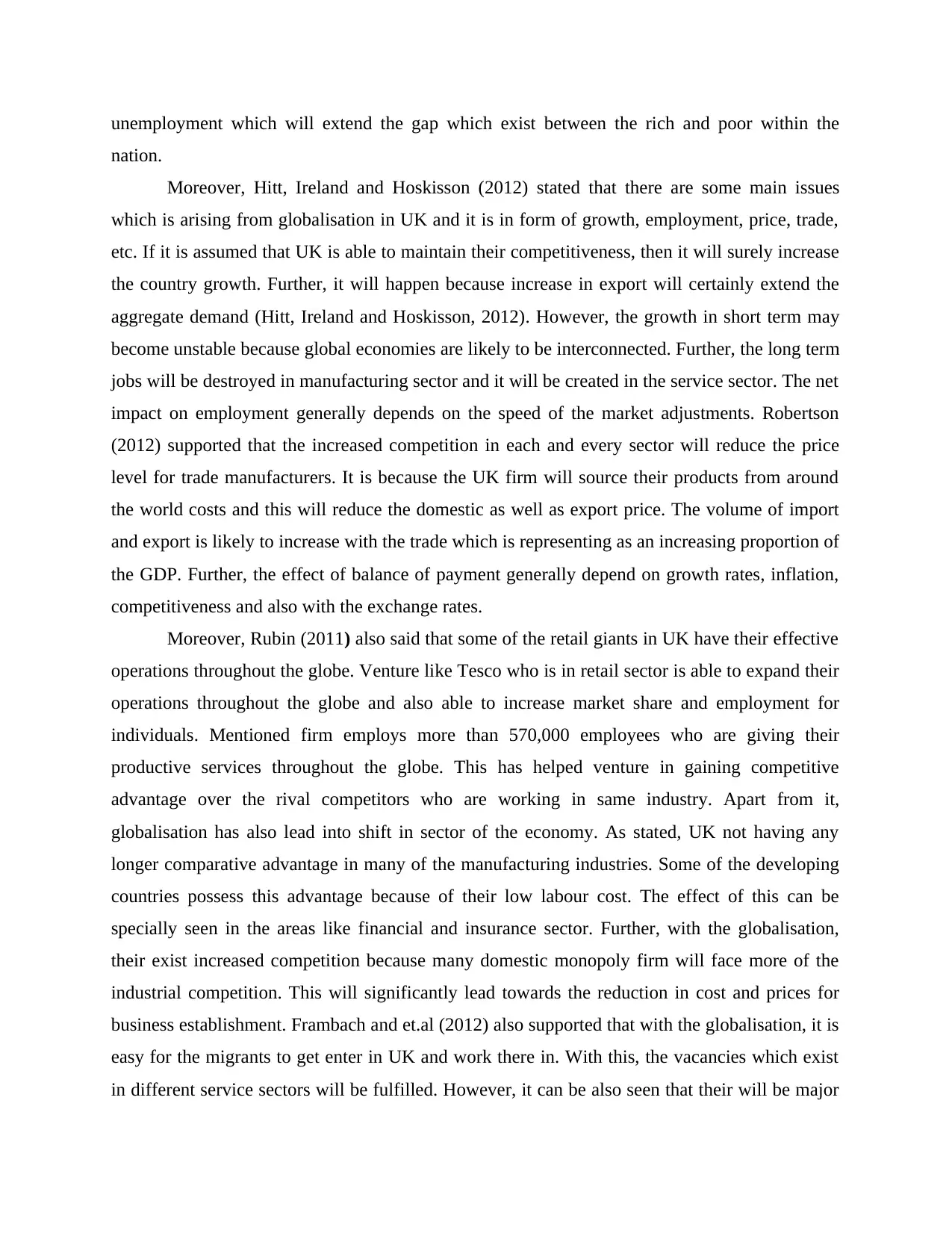
unemployment which will extend the gap which exist between the rich and poor within the
nation.
Moreover, Hitt, Ireland and Hoskisson (2012) stated that there are some main issues
which is arising from globalisation in UK and it is in form of growth, employment, price, trade,
etc. If it is assumed that UK is able to maintain their competitiveness, then it will surely increase
the country growth. Further, it will happen because increase in export will certainly extend the
aggregate demand (Hitt, Ireland and Hoskisson, 2012). However, the growth in short term may
become unstable because global economies are likely to be interconnected. Further, the long term
jobs will be destroyed in manufacturing sector and it will be created in the service sector. The net
impact on employment generally depends on the speed of the market adjustments. Robertson
(2012) supported that the increased competition in each and every sector will reduce the price
level for trade manufacturers. It is because the UK firm will source their products from around
the world costs and this will reduce the domestic as well as export price. The volume of import
and export is likely to increase with the trade which is representing as an increasing proportion of
the GDP. Further, the effect of balance of payment generally depend on growth rates, inflation,
competitiveness and also with the exchange rates.
Moreover, Rubin (2011) also said that some of the retail giants in UK have their effective
operations throughout the globe. Venture like Tesco who is in retail sector is able to expand their
operations throughout the globe and also able to increase market share and employment for
individuals. Mentioned firm employs more than 570,000 employees who are giving their
productive services throughout the globe. This has helped venture in gaining competitive
advantage over the rival competitors who are working in same industry. Apart from it,
globalisation has also lead into shift in sector of the economy. As stated, UK not having any
longer comparative advantage in many of the manufacturing industries. Some of the developing
countries possess this advantage because of their low labour cost. The effect of this can be
specially seen in the areas like financial and insurance sector. Further, with the globalisation,
their exist increased competition because many domestic monopoly firm will face more of the
industrial competition. This will significantly lead towards the reduction in cost and prices for
business establishment. Frambach and et.al (2012) also supported that with the globalisation, it is
easy for the migrants to get enter in UK and work there in. With this, the vacancies which exist
in different service sectors will be fulfilled. However, it can be also seen that their will be major
nation.
Moreover, Hitt, Ireland and Hoskisson (2012) stated that there are some main issues
which is arising from globalisation in UK and it is in form of growth, employment, price, trade,
etc. If it is assumed that UK is able to maintain their competitiveness, then it will surely increase
the country growth. Further, it will happen because increase in export will certainly extend the
aggregate demand (Hitt, Ireland and Hoskisson, 2012). However, the growth in short term may
become unstable because global economies are likely to be interconnected. Further, the long term
jobs will be destroyed in manufacturing sector and it will be created in the service sector. The net
impact on employment generally depends on the speed of the market adjustments. Robertson
(2012) supported that the increased competition in each and every sector will reduce the price
level for trade manufacturers. It is because the UK firm will source their products from around
the world costs and this will reduce the domestic as well as export price. The volume of import
and export is likely to increase with the trade which is representing as an increasing proportion of
the GDP. Further, the effect of balance of payment generally depend on growth rates, inflation,
competitiveness and also with the exchange rates.
Moreover, Rubin (2011) also said that some of the retail giants in UK have their effective
operations throughout the globe. Venture like Tesco who is in retail sector is able to expand their
operations throughout the globe and also able to increase market share and employment for
individuals. Mentioned firm employs more than 570,000 employees who are giving their
productive services throughout the globe. This has helped venture in gaining competitive
advantage over the rival competitors who are working in same industry. Apart from it,
globalisation has also lead into shift in sector of the economy. As stated, UK not having any
longer comparative advantage in many of the manufacturing industries. Some of the developing
countries possess this advantage because of their low labour cost. The effect of this can be
specially seen in the areas like financial and insurance sector. Further, with the globalisation,
their exist increased competition because many domestic monopoly firm will face more of the
industrial competition. This will significantly lead towards the reduction in cost and prices for
business establishment. Frambach and et.al (2012) also supported that with the globalisation, it is
easy for the migrants to get enter in UK and work there in. With this, the vacancies which exist
in different service sectors will be fulfilled. However, it can be also seen that their will be major
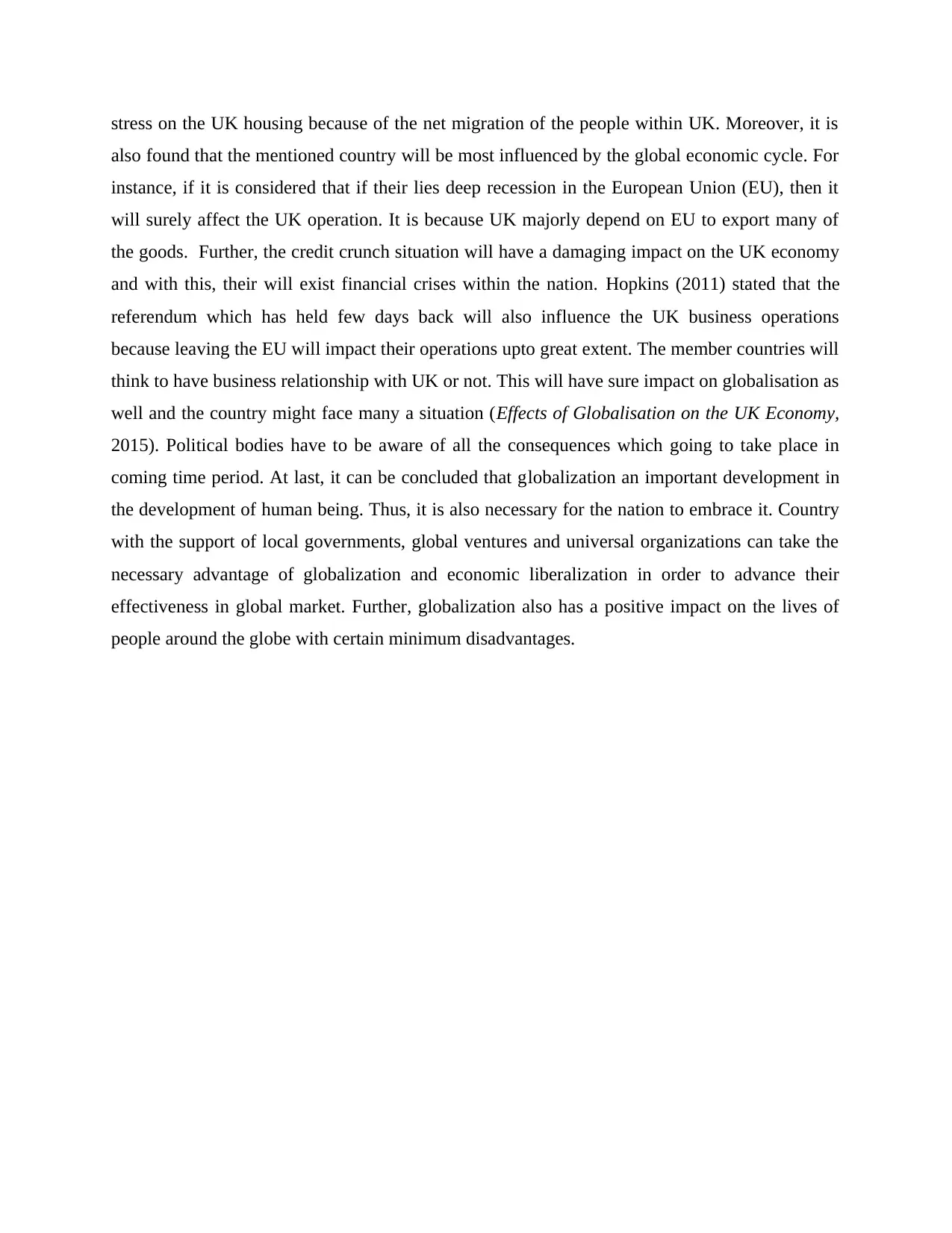
stress on the UK housing because of the net migration of the people within UK. Moreover, it is
also found that the mentioned country will be most influenced by the global economic cycle. For
instance, if it is considered that if their lies deep recession in the European Union (EU), then it
will surely affect the UK operation. It is because UK majorly depend on EU to export many of
the goods. Further, the credit crunch situation will have a damaging impact on the UK economy
and with this, their will exist financial crises within the nation. Hopkins (2011) stated that the
referendum which has held few days back will also influence the UK business operations
because leaving the EU will impact their operations upto great extent. The member countries will
think to have business relationship with UK or not. This will have sure impact on globalisation as
well and the country might face many a situation (Effects of Globalisation on the UK Economy,
2015). Political bodies have to be aware of all the consequences which going to take place in
coming time period. At last, it can be concluded that globalization an important development in
the development of human being. Thus, it is also necessary for the nation to embrace it. Country
with the support of local governments, global ventures and universal organizations can take the
necessary advantage of globalization and economic liberalization in order to advance their
effectiveness in global market. Further, globalization also has a positive impact on the lives of
people around the globe with certain minimum disadvantages.
also found that the mentioned country will be most influenced by the global economic cycle. For
instance, if it is considered that if their lies deep recession in the European Union (EU), then it
will surely affect the UK operation. It is because UK majorly depend on EU to export many of
the goods. Further, the credit crunch situation will have a damaging impact on the UK economy
and with this, their will exist financial crises within the nation. Hopkins (2011) stated that the
referendum which has held few days back will also influence the UK business operations
because leaving the EU will impact their operations upto great extent. The member countries will
think to have business relationship with UK or not. This will have sure impact on globalisation as
well and the country might face many a situation (Effects of Globalisation on the UK Economy,
2015). Political bodies have to be aware of all the consequences which going to take place in
coming time period. At last, it can be concluded that globalization an important development in
the development of human being. Thus, it is also necessary for the nation to embrace it. Country
with the support of local governments, global ventures and universal organizations can take the
necessary advantage of globalization and economic liberalization in order to advance their
effectiveness in global market. Further, globalization also has a positive impact on the lives of
people around the globe with certain minimum disadvantages.
⊘ This is a preview!⊘
Do you want full access?
Subscribe today to unlock all pages.

Trusted by 1+ million students worldwide
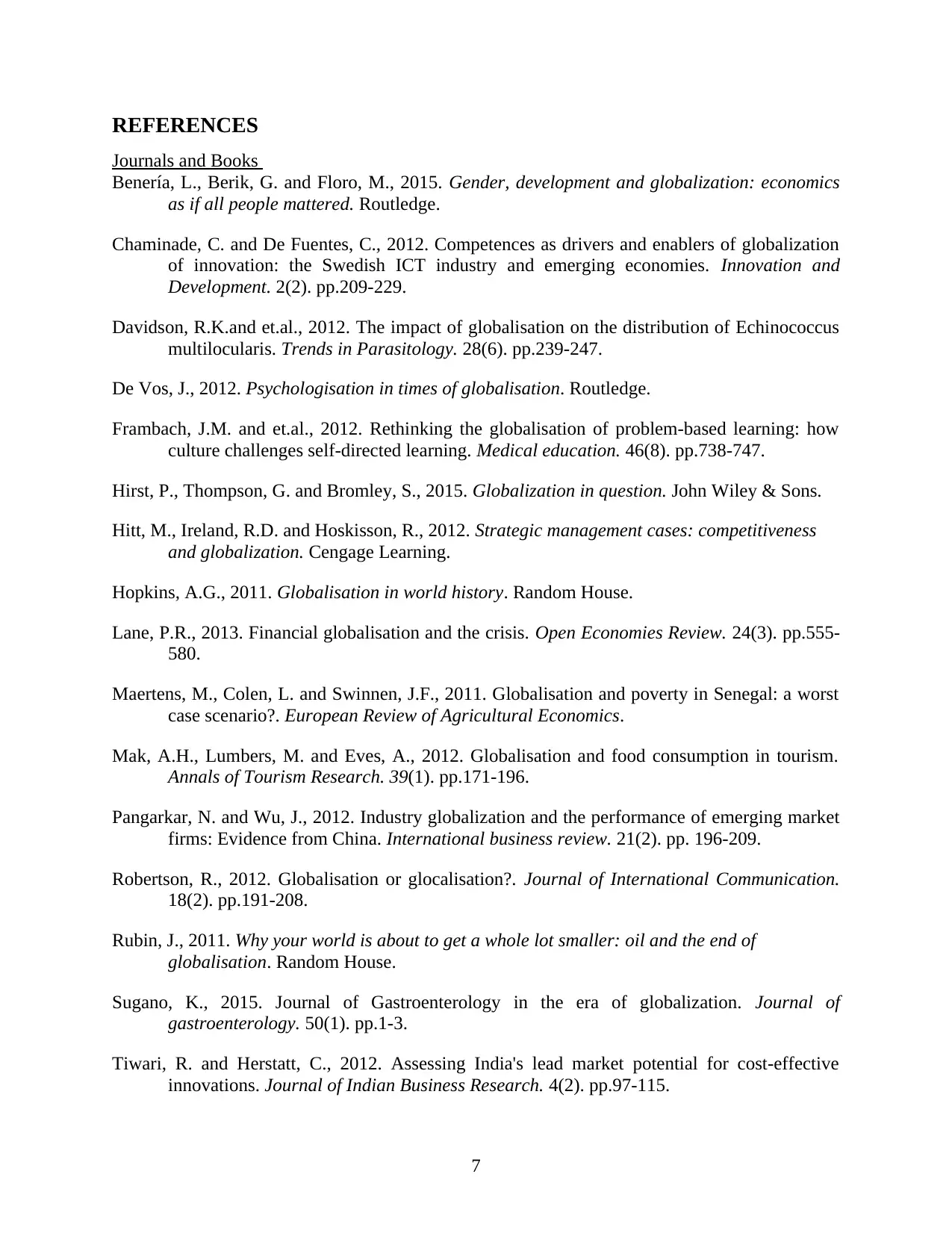
REFERENCES
Journals and Books
Benería, L., Berik, G. and Floro, M., 2015. Gender, development and globalization: economics
as if all people mattered. Routledge.
Chaminade, C. and De Fuentes, C., 2012. Competences as drivers and enablers of globalization
of innovation: the Swedish ICT industry and emerging economies. Innovation and
Development. 2(2). pp.209-229.
Davidson, R.K.and et.al., 2012. The impact of globalisation on the distribution of Echinococcus
multilocularis. Trends in Parasitology. 28(6). pp.239-247.
De Vos, J., 2012. Psychologisation in times of globalisation. Routledge.
Frambach, J.M. and et.al., 2012. Rethinking the globalisation of problem‐based learning: how
culture challenges self‐directed learning. Medical education. 46(8). pp.738-747.
Hirst, P., Thompson, G. and Bromley, S., 2015. Globalization in question. John Wiley & Sons.
Hitt, M., Ireland, R.D. and Hoskisson, R., 2012. Strategic management cases: competitiveness
and globalization. Cengage Learning.
Hopkins, A.G., 2011. Globalisation in world history. Random House.
Lane, P.R., 2013. Financial globalisation and the crisis. Open Economies Review. 24(3). pp.555-
580.
Maertens, M., Colen, L. and Swinnen, J.F., 2011. Globalisation and poverty in Senegal: a worst
case scenario?. European Review of Agricultural Economics.
Mak, A.H., Lumbers, M. and Eves, A., 2012. Globalisation and food consumption in tourism.
Annals of Tourism Research. 39(1). pp.171-196.
Pangarkar, N. and Wu, J., 2012. Industry globalization and the performance of emerging market
firms: Evidence from China. International business review. 21(2). pp. 196-209.
Robertson, R., 2012. Globalisation or glocalisation?. Journal of International Communication.
18(2). pp.191-208.
Rubin, J., 2011. Why your world is about to get a whole lot smaller: oil and the end of
globalisation. Random House.
Sugano, K., 2015. Journal of Gastroenterology in the era of globalization. Journal of
gastroenterology. 50(1). pp.1-3.
Tiwari, R. and Herstatt, C., 2012. Assessing India's lead market potential for cost-effective
innovations. Journal of Indian Business Research. 4(2). pp.97-115.
7
Journals and Books
Benería, L., Berik, G. and Floro, M., 2015. Gender, development and globalization: economics
as if all people mattered. Routledge.
Chaminade, C. and De Fuentes, C., 2012. Competences as drivers and enablers of globalization
of innovation: the Swedish ICT industry and emerging economies. Innovation and
Development. 2(2). pp.209-229.
Davidson, R.K.and et.al., 2012. The impact of globalisation on the distribution of Echinococcus
multilocularis. Trends in Parasitology. 28(6). pp.239-247.
De Vos, J., 2012. Psychologisation in times of globalisation. Routledge.
Frambach, J.M. and et.al., 2012. Rethinking the globalisation of problem‐based learning: how
culture challenges self‐directed learning. Medical education. 46(8). pp.738-747.
Hirst, P., Thompson, G. and Bromley, S., 2015. Globalization in question. John Wiley & Sons.
Hitt, M., Ireland, R.D. and Hoskisson, R., 2012. Strategic management cases: competitiveness
and globalization. Cengage Learning.
Hopkins, A.G., 2011. Globalisation in world history. Random House.
Lane, P.R., 2013. Financial globalisation and the crisis. Open Economies Review. 24(3). pp.555-
580.
Maertens, M., Colen, L. and Swinnen, J.F., 2011. Globalisation and poverty in Senegal: a worst
case scenario?. European Review of Agricultural Economics.
Mak, A.H., Lumbers, M. and Eves, A., 2012. Globalisation and food consumption in tourism.
Annals of Tourism Research. 39(1). pp.171-196.
Pangarkar, N. and Wu, J., 2012. Industry globalization and the performance of emerging market
firms: Evidence from China. International business review. 21(2). pp. 196-209.
Robertson, R., 2012. Globalisation or glocalisation?. Journal of International Communication.
18(2). pp.191-208.
Rubin, J., 2011. Why your world is about to get a whole lot smaller: oil and the end of
globalisation. Random House.
Sugano, K., 2015. Journal of Gastroenterology in the era of globalization. Journal of
gastroenterology. 50(1). pp.1-3.
Tiwari, R. and Herstatt, C., 2012. Assessing India's lead market potential for cost-effective
innovations. Journal of Indian Business Research. 4(2). pp.97-115.
7
Paraphrase This Document
Need a fresh take? Get an instant paraphrase of this document with our AI Paraphraser
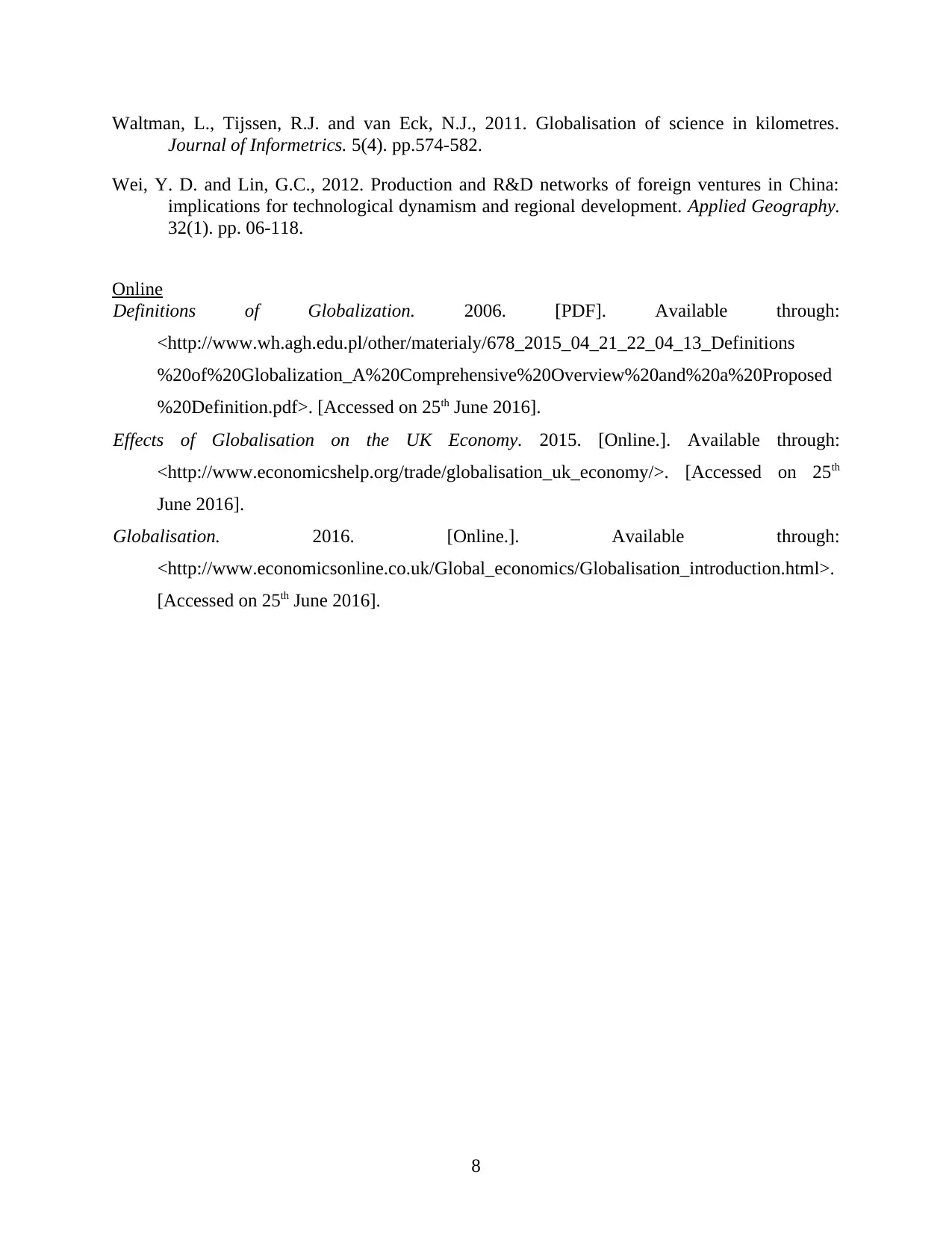
Waltman, L., Tijssen, R.J. and van Eck, N.J., 2011. Globalisation of science in kilometres.
Journal of Informetrics. 5(4). pp.574-582.
Wei, Y. D. and Lin, G.C., 2012. Production and R&D networks of foreign ventures in China:
implications for technological dynamism and regional development. Applied Geography.
32(1). pp. 06-118.
Online
Definitions of Globalization. 2006. [PDF]. Available through:
<http://www.wh.agh.edu.pl/other/materialy/678_2015_04_21_22_04_13_Definitions
%20of%20Globalization_A%20Comprehensive%20Overview%20and%20a%20Proposed
%20Definition.pdf>. [Accessed on 25th June 2016].
Effects of Globalisation on the UK Economy. 2015. [Online.]. Available through:
<http://www.economicshelp.org/trade/globalisation_uk_economy/>. [Accessed on 25th
June 2016].
Globalisation. 2016. [Online.]. Available through:
<http://www.economicsonline.co.uk/Global_economics/Globalisation_introduction.html>.
[Accessed on 25th June 2016].
8
Journal of Informetrics. 5(4). pp.574-582.
Wei, Y. D. and Lin, G.C., 2012. Production and R&D networks of foreign ventures in China:
implications for technological dynamism and regional development. Applied Geography.
32(1). pp. 06-118.
Online
Definitions of Globalization. 2006. [PDF]. Available through:
<http://www.wh.agh.edu.pl/other/materialy/678_2015_04_21_22_04_13_Definitions
%20of%20Globalization_A%20Comprehensive%20Overview%20and%20a%20Proposed
%20Definition.pdf>. [Accessed on 25th June 2016].
Effects of Globalisation on the UK Economy. 2015. [Online.]. Available through:
<http://www.economicshelp.org/trade/globalisation_uk_economy/>. [Accessed on 25th
June 2016].
Globalisation. 2016. [Online.]. Available through:
<http://www.economicsonline.co.uk/Global_economics/Globalisation_introduction.html>.
[Accessed on 25th June 2016].
8
1 out of 8
Related Documents
Your All-in-One AI-Powered Toolkit for Academic Success.
+13062052269
info@desklib.com
Available 24*7 on WhatsApp / Email
![[object Object]](/_next/static/media/star-bottom.7253800d.svg)
Unlock your academic potential
Copyright © 2020–2026 A2Z Services. All Rights Reserved. Developed and managed by ZUCOL.





